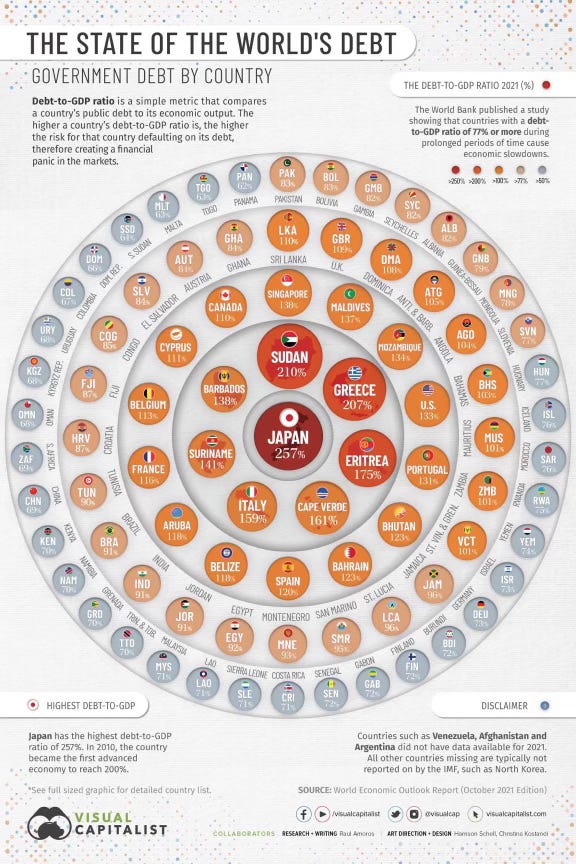It’s dangerous for me to write about the plumbing of our global financial system. It’s super complicated, and I’m not that smart. That disclaimer aside, a recent development seems straight forward enough that it felt worth writing about.
Full Disclaimer: it is very hard to find anything in writing about this beyond tweets. here is an article, who’s quoted source is a tweet.. TFTC - The U.S. Bails Out Japan, and a substack of a fella who appears to study the U.S. / Japan thing pretty closely: Dollar Endgame
The outline is thus:
Japan has been the last major country with very low interest rates on their sovereign debt.
This rate is not driven by free markets, but by the Bank of Japan. The Bank of Japan basically prints Yen to buy their own government debt so they can keep the rate low. (There are days when the only buyer of Japanese Government debt is the Bank of Japan. Welcome to the twilight zone.)
This is because Japan has the highest debt to GDP of any developed country. By a mile. If the cost to borrow for Japan’s government went up near the U.S. Treasury rate, it could bankrupt the country.
The pickle is obvious: the more Japan prints to buy government debt, the weaker their currency gets vs. the dollar.
Financial professionals are aware of this pickle Japan is in.
These financial professionals have reacted by placing trades that put pressure on the value of Japan’s currency, the Yen, in its exchange rate vs. the dollar. (Think of this similar to George Soros’ famous bet against the British pound, but the goal here appears to just keep milking the problem profitably instead of “breaking” the Yen.)
The Bank of Japan is trying to defend their exchange rate to keep their currency from devaluing too much. If everything they import becomes too expensive because of a weak Yen, domestic trouble will ensue. (Remember WW2 w/ Japan started somewhat because Japan has to important so many things a modern economy needs, starting with oil.)
What can they do to defend the exchange rate? Buy back the very Yen they are printing into the economy, (laundered through government spending and interest on/repayment of previous debt), to buy bonds.
How do you buy back Yen without printing more Yen or raising taxes? Sell something.
Japan has ~$1 Trillion in U.S. Treasuries they can sell. They would get dollars for these and then use them to buy back Yen.
Enter the Fed.
Japan selling $1 Trillion worth of U.S. Treasuries into the same market we are trying to sell trillions of debt into (and control the rate on) would not be great.
Solution: The Fed has opened a “Swap Line” with the Bank of Japan. They can swap Yen for Dollars with the Fed. This means they can print Yen to buy Yen! The Fed won’t be spending the freshly printed Yen. The freshly printed dollars will take old Yen out of the market.
Problem solved. Japan defends the unnaturally low rates on their government debt, Yen is taken out of circulation, and Japan doesn’t have to sell U.S. Treasuries.
Sounds great for Japan. Let’s look at this from the opposite point of view.
The Fed is paying Japan in freshly printed dollars not to sell their U.S. Treasuries. This is basically borrowing treasuries.
The U.S. Dollars being spent to buy “Yen” (real goal = putting U.S. Treasuries on lay-away), go out into the market increasing the money supply.
How is this not QE? The Fed is putting new money out into the market by “borrowing” U.S. Treasuries, (with Japanese Yen as collateral). Fed is now “owner” of more U.S. debt, and more dollars in the economy.
If this is the best option, heaven help us.





I know nothing and that whole scenario sounds scarey 🙏🙏🙏